American actor Richard Barthelmess (1895-1963) is best known for his roles in the films of D.W. Griffith. In 1928, he was nominated for the Academy Award for Best Actor for two films: The Patent Leather Kid and The Noose. Barthelmess made 75 films in the twenty years between his first feature in 1916 and his semi-retirement from the screen in 1936. He appeared in only six more films between 1936 and 1942.
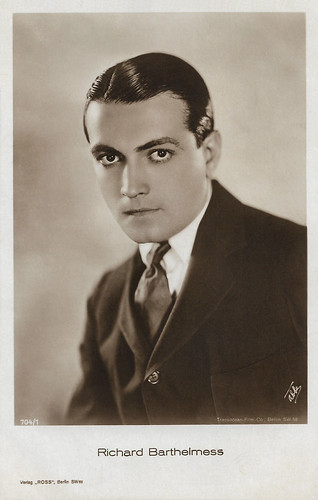
German postcard by Ross Verlag, Berlin, no. 704/1, 1925-1926. Photo: James Abbe / Transocean-Film Co. Berlin.
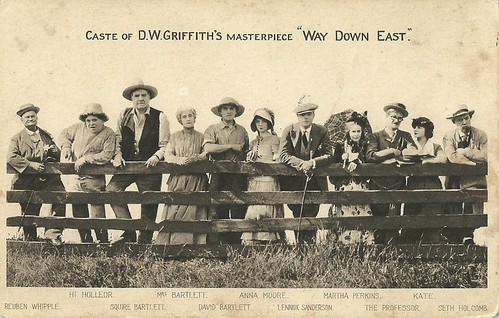
British postcard by Cinema Art, London. The cast of D.W. Griffith's film Way Down East (1920). From left to right, the actors George Neville, Edgar Nelson, Burr McIntosh, Kate Bruce, Richard Barthelmess, Lillian Gish, Lowell Sherman, Vivia Ogden, Creighton Hale, Mary Hay, Porter Strong.
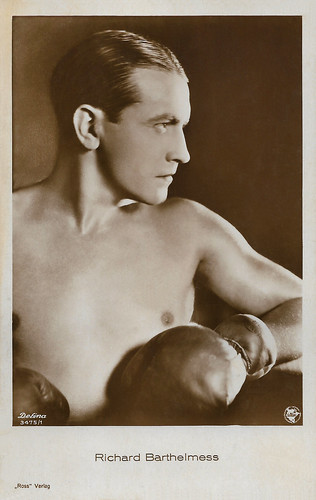
German postcard by Ross Verlag, no. 3475/1, 1928-1929. Photo: Defina / First National Pictures. Publicity still for The Patent Leather Kid (Alfred Santell, 1927).
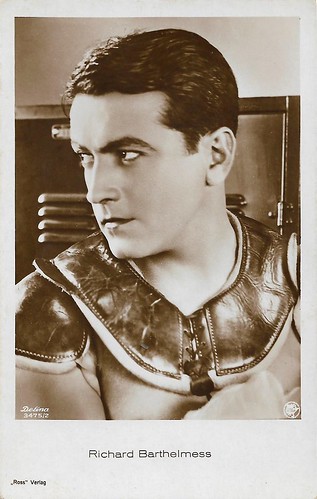
German postcard by Ross Verlag, no. 3475/2, 1928-1929. Photo: Defina / First National. Publicity still for The Drop-Kick (Millard Webb, 1927).
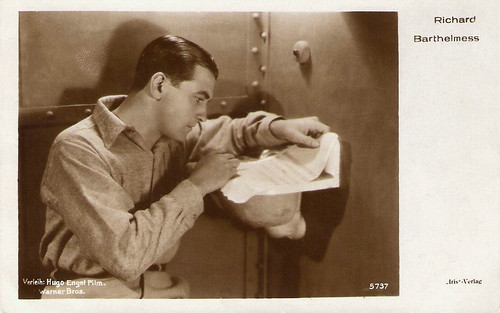
Austrian postcard by Iris-Verlag, no. 5737. Photo: Hugo Engel Film / Warner Bros.
Richard Semler Barthelmess was born in 1895 in New York City into a theatrical family. His mother was the actress Caroline Harris. His father, Alfred W. Barthelmess, died when he was one year old.
While attending Trinity College in Connecticut, he began appearing in college and other amateur productions. While on vacation in 1916, a friend of his mother, actress Alla Nazimova, advised the 21-year-old Barthelmess to become a professional actor and Richard never returned to college.
He made his debut screen appearance as an uncredited extra in the serial Gloria's Romance (Walter Edwin, Colin Campbell, 1916), starring Billie Burke. He also appeared as a supporting player in several films starring Marguerite Clark. Then, Alla Nazimova, offered him a part in her film debut, the war drama War Brides (Herbert Brenon, 1916).
By 1919, he had five years in stock company experience. That year he signed a contract with D.W. Griffith. Griffith put Richard into Broken Blossoms (D. W. Griffith, 1919). It tells the story of young girl, Lucy Burrows (Lillian Gish), who is abused by her alcoholic prizefighting father, Battling Burrows (Donald Crisp), and meets Cheng Huan, a kind-hearted Chinese man (Barthelmess) who falls in love with her. The role made him a star, and showed that he had an uncanny ability to become the characters he played.
The next year, he was again teamed with Lillian Gish in Way Down East (D.W. Griffith, 1920). This film set the standard for many films in the future. Best remembered is the river scene in which Richard jumps over the ice floes in search of Lillian as she heads towards the falls. Way Down East is the fourth highest grossing silent film in cinema history, taking in more than $4.5 million at the box office in 1920.
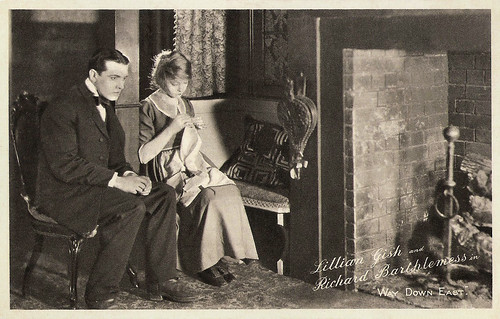
British postcard by Cinema Art, London. Photo: publicity still for Way Down East (David Wark Griffith, 1920) with Lillian Gish.
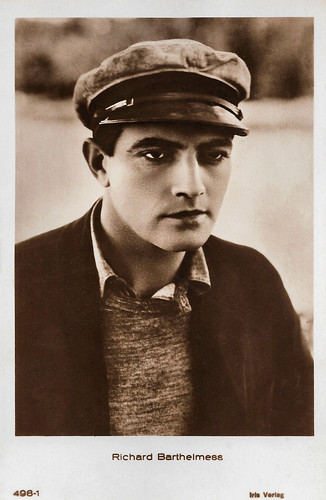
Austrian postcard by Iris Verlag, no. 498-1. Photo: publicity still for The Love Flower (D.W. Griffith, 1920).
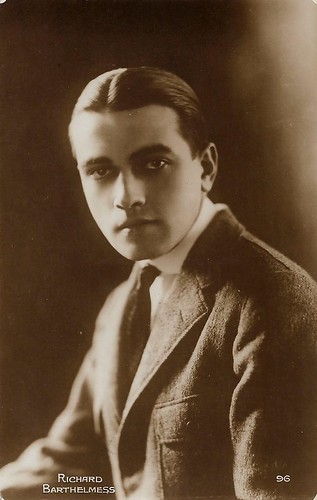
French postcard by Editions Cinémagazine, no. 96.
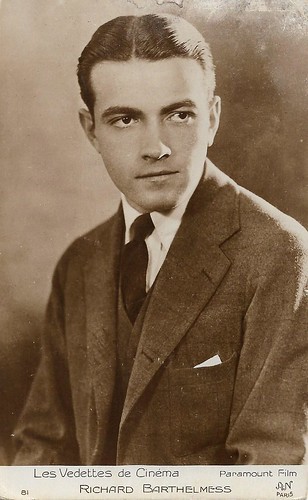
French postcard in the Les Vedettes de Cinéma series by A.N., Paris, no. 81. Photo: Paramount Film.
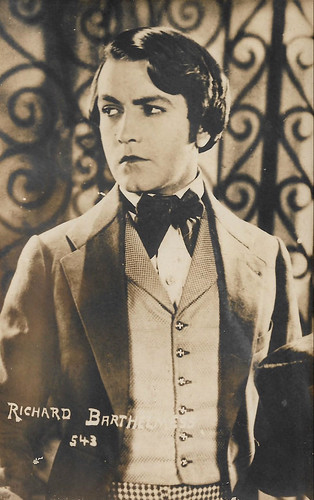
Spanish postcard, no. 543. Photo: publicity still for The Bright Shawl (John S. Robertson, 1923).
Richard Barthelmess formed Inspiration Pictures, together with Charles Duell and Henry King, to make Tol'able David (Henry King, 1921) and gave one of his best performances as a teenage mailman who finds courage and saves the U.S. mail from the outlaws. In 1922, Photoplay described him as the "idol of every girl in America."
Richard Barthelmess remained popular throughout the 1920s and became one of the biggest stars at First National Pictures. In the first year that the Oscars were given out, 1927, he received Academy Award nominations for The Patent Leather Kid (Alfred Santell, 1927) and The Noose (John Francis Dillon, 1928). The Patent Leather Kid tells the story of a boxer who scoffs at fighting outside the ring... particularly for the United States once it enters World War I. Eventually, he is drafted, is shipped overseas, and performs a heroic act, which results in his being severely wounded.
He remained with First National when it was absorbed in 1928 by Warner Bros. Sound was not a medium that would embrace Richard. He did make a number of talkies in the first few years of sound, most notably The Dawn Patrol (Howard Hawks, 1930), The Cabin in the Cotton (Michael Curtiz, 1932) with Bette Davis, and Central Airport (William Wellman, 1933). His acting technique was not well suited for sound and the parts began to get smaller. His last film performances were in character roles, often unsympathetic in nature.
By the mid-1930s, his film career was over. But he came back with a fine performance in Howard Hawks' Only Angels Have Wings (1939), in which he played Rita Hayworth's character's husband, a pilot for a ramshackle airmail and freight service. He has been persona non grata with the other pilots ever since his carelessness cost the life of one of their number. Rita's faithlessness makes his life even more difficult.
In 1942, Barthelmess joined the Navy Reserve, and served as a lieutenant commander. When the war ended, he retired to Long Island and lived off his real estate investments.
Richard Barthelmess died of throat cancer in 1963 in Southampton, New York. He was married to actress Mary Hay from 1920 till their divorce in 1927. They had a daughter, Mary. He married Jessica Stewart Sargent in 1928. They adopted a stepson, Stuart, and remained together till Richard's death.
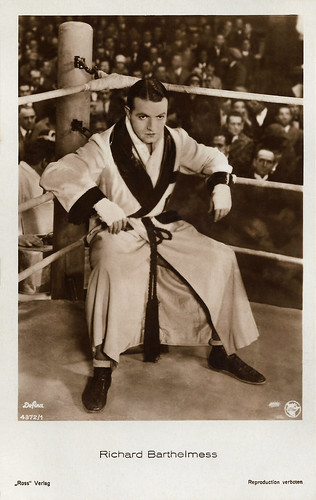
German postcard by Ross Verlag, no. 4372/1, 1929-1930. Photo: First National Pictures. Publicity still for The Patent Leather Kid (1927).
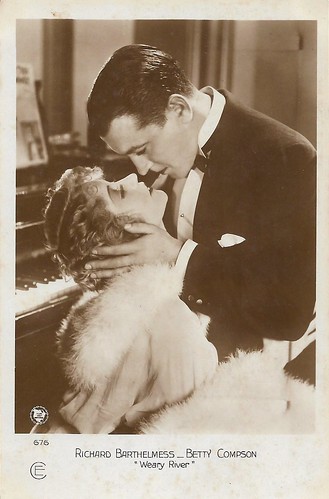
French postcard by Cinémagazine-Editions, no. 676. Photo: First National. Publicity still of Richard Barthelmess and Betty Compson in Weary River (Frank Lloyd, 1929).
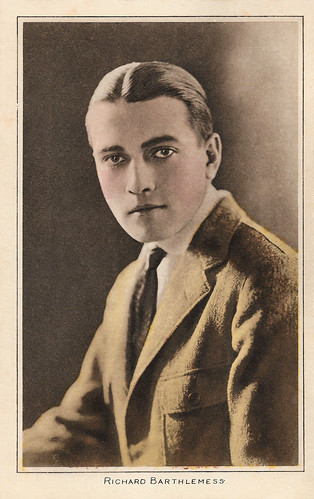
British postcard in the 'Pictures' Portrait Gallery by Pictures Ltd., London, no. 122. Barthelmess is misspelled as Barthlemess.
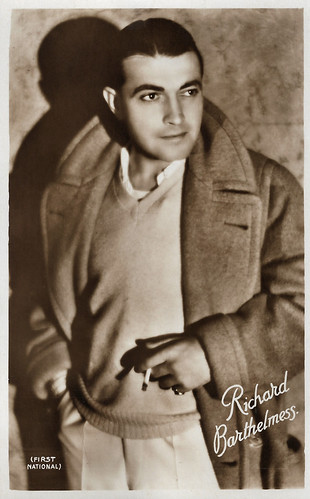
British postcard, no. 52 of a second Series of 42 Cinema Stars, Issued with Sarony Cigarettes. Photo: First National.
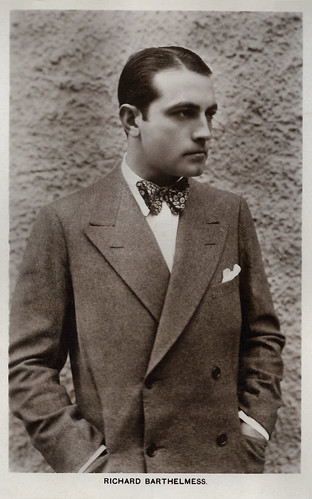
British postcard in the Picturegoer Series, London, no. 127a.
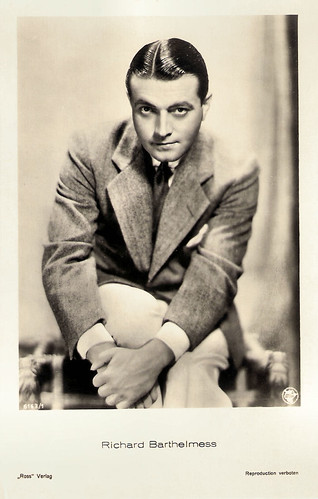
German postcard by Ross Verlag, no. 6163/1, 1931-1932. Photo: First National Pictures.
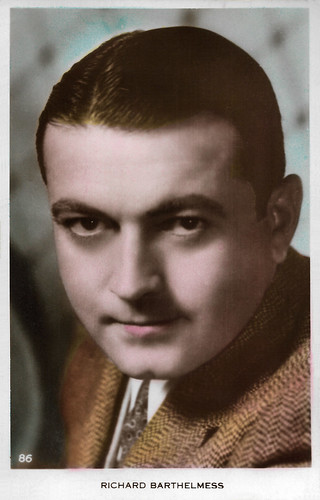
British postcard by Art Photo, no. 37-1.
Sources: Tony Fontana (IMDb), Hal Erickson (AllMovie), William Bjornstad (Find a Grave), Wikipedia and IMDb.

German postcard by Ross Verlag, Berlin, no. 704/1, 1925-1926. Photo: James Abbe / Transocean-Film Co. Berlin.

British postcard by Cinema Art, London. The cast of D.W. Griffith's film Way Down East (1920). From left to right, the actors George Neville, Edgar Nelson, Burr McIntosh, Kate Bruce, Richard Barthelmess, Lillian Gish, Lowell Sherman, Vivia Ogden, Creighton Hale, Mary Hay, Porter Strong.

German postcard by Ross Verlag, no. 3475/1, 1928-1929. Photo: Defina / First National Pictures. Publicity still for The Patent Leather Kid (Alfred Santell, 1927).

German postcard by Ross Verlag, no. 3475/2, 1928-1929. Photo: Defina / First National. Publicity still for The Drop-Kick (Millard Webb, 1927).

Austrian postcard by Iris-Verlag, no. 5737. Photo: Hugo Engel Film / Warner Bros.
Jumping over the ice floes
Richard Semler Barthelmess was born in 1895 in New York City into a theatrical family. His mother was the actress Caroline Harris. His father, Alfred W. Barthelmess, died when he was one year old.
While attending Trinity College in Connecticut, he began appearing in college and other amateur productions. While on vacation in 1916, a friend of his mother, actress Alla Nazimova, advised the 21-year-old Barthelmess to become a professional actor and Richard never returned to college.
He made his debut screen appearance as an uncredited extra in the serial Gloria's Romance (Walter Edwin, Colin Campbell, 1916), starring Billie Burke. He also appeared as a supporting player in several films starring Marguerite Clark. Then, Alla Nazimova, offered him a part in her film debut, the war drama War Brides (Herbert Brenon, 1916).
By 1919, he had five years in stock company experience. That year he signed a contract with D.W. Griffith. Griffith put Richard into Broken Blossoms (D. W. Griffith, 1919). It tells the story of young girl, Lucy Burrows (Lillian Gish), who is abused by her alcoholic prizefighting father, Battling Burrows (Donald Crisp), and meets Cheng Huan, a kind-hearted Chinese man (Barthelmess) who falls in love with her. The role made him a star, and showed that he had an uncanny ability to become the characters he played.
The next year, he was again teamed with Lillian Gish in Way Down East (D.W. Griffith, 1920). This film set the standard for many films in the future. Best remembered is the river scene in which Richard jumps over the ice floes in search of Lillian as she heads towards the falls. Way Down East is the fourth highest grossing silent film in cinema history, taking in more than $4.5 million at the box office in 1920.

British postcard by Cinema Art, London. Photo: publicity still for Way Down East (David Wark Griffith, 1920) with Lillian Gish.

Austrian postcard by Iris Verlag, no. 498-1. Photo: publicity still for The Love Flower (D.W. Griffith, 1920).

French postcard by Editions Cinémagazine, no. 96.

French postcard in the Les Vedettes de Cinéma series by A.N., Paris, no. 81. Photo: Paramount Film.

Spanish postcard, no. 543. Photo: publicity still for The Bright Shawl (John S. Robertson, 1923).
The idol of every girl in America
Richard Barthelmess formed Inspiration Pictures, together with Charles Duell and Henry King, to make Tol'able David (Henry King, 1921) and gave one of his best performances as a teenage mailman who finds courage and saves the U.S. mail from the outlaws. In 1922, Photoplay described him as the "idol of every girl in America."
Richard Barthelmess remained popular throughout the 1920s and became one of the biggest stars at First National Pictures. In the first year that the Oscars were given out, 1927, he received Academy Award nominations for The Patent Leather Kid (Alfred Santell, 1927) and The Noose (John Francis Dillon, 1928). The Patent Leather Kid tells the story of a boxer who scoffs at fighting outside the ring... particularly for the United States once it enters World War I. Eventually, he is drafted, is shipped overseas, and performs a heroic act, which results in his being severely wounded.
He remained with First National when it was absorbed in 1928 by Warner Bros. Sound was not a medium that would embrace Richard. He did make a number of talkies in the first few years of sound, most notably The Dawn Patrol (Howard Hawks, 1930), The Cabin in the Cotton (Michael Curtiz, 1932) with Bette Davis, and Central Airport (William Wellman, 1933). His acting technique was not well suited for sound and the parts began to get smaller. His last film performances were in character roles, often unsympathetic in nature.
By the mid-1930s, his film career was over. But he came back with a fine performance in Howard Hawks' Only Angels Have Wings (1939), in which he played Rita Hayworth's character's husband, a pilot for a ramshackle airmail and freight service. He has been persona non grata with the other pilots ever since his carelessness cost the life of one of their number. Rita's faithlessness makes his life even more difficult.
In 1942, Barthelmess joined the Navy Reserve, and served as a lieutenant commander. When the war ended, he retired to Long Island and lived off his real estate investments.
Richard Barthelmess died of throat cancer in 1963 in Southampton, New York. He was married to actress Mary Hay from 1920 till their divorce in 1927. They had a daughter, Mary. He married Jessica Stewart Sargent in 1928. They adopted a stepson, Stuart, and remained together till Richard's death.

German postcard by Ross Verlag, no. 4372/1, 1929-1930. Photo: First National Pictures. Publicity still for The Patent Leather Kid (1927).

French postcard by Cinémagazine-Editions, no. 676. Photo: First National. Publicity still of Richard Barthelmess and Betty Compson in Weary River (Frank Lloyd, 1929).

British postcard in the 'Pictures' Portrait Gallery by Pictures Ltd., London, no. 122. Barthelmess is misspelled as Barthlemess.

British postcard, no. 52 of a second Series of 42 Cinema Stars, Issued with Sarony Cigarettes. Photo: First National.

British postcard in the Picturegoer Series, London, no. 127a.

German postcard by Ross Verlag, no. 6163/1, 1931-1932. Photo: First National Pictures.

British postcard by Art Photo, no. 37-1.
Sources: Tony Fontana (IMDb), Hal Erickson (AllMovie), William Bjornstad (Find a Grave), Wikipedia and IMDb.
No comments:
Post a Comment